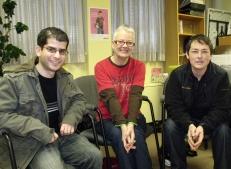A national project is spotlighting the unique and “seriously under-researched” challenges faced by gay and lesbian caregivers.
The three-year initiative — funded by the federal government through the BC Psychogeriatric Association — aims to develop better tools for caregivers of older adults, as well as for related support workers and policy makers.
According to principle investigator Penny MacCourt, more information is needed on the “over and above” stresses the gay community faces in the care environment.
At a Vancouver workshop hosted by Qmunity, participants highlighted the emotional, financial and social impacts of their caregiving roles.
They also described gay-specific challenges, which could include relevant resources, recognition of relationships and next of kin, family conflict, not having children, non-traditional support networks, being forced to come out, or not seeking support due to real or perceived homophobia.
Suzanne Cole is the sole caregiver for her 87-year-old mother, who has stroke-related dementia.
Cole says she feels stressed and depressed by her situation and the strained relationship with her mother, in which past tensions have resurfaced.
“I’ve felt really isolated. I’m discovering more and more that I don’t have a life,” she says.
Hossein Kia, a social worker studying gay caregivers, describes the field as “seriously under-researched” with only a handful of studies available worldwide.
He says gay caregivers often experience ignorance and disrespect when accessing mainstream services.
“[Gay] caregivers often have to prove the legitimacy of their role and confront a lack of awareness in the system,” Kia explains. “Being a caregiver is hard enough without having to educate as well.”
Alexandra Henriques, coordinator of Qmunity’s Generations program for older adults, has observed that gay and lesbian caregivers may be vulnerable to exploitation or abuse.
“A pattern I have noticed is that the ‘unmarried’ daughters and ‘effeminate’ sons are often left to do the caregiving by the rest of the family,” she says.
Kia agrees: “With queer men and women, regardless of whether they’re in a relationship, there’s an assumption of singleness and being at the disposal of others.”
Based on feedback from workshops across Canada — including another gay session in Toronto in March — the project team aims to improve services offered to caregivers and to target policy development toward specific needs.

 Why you can trust Xtra
Why you can trust Xtra


